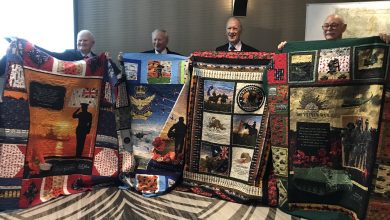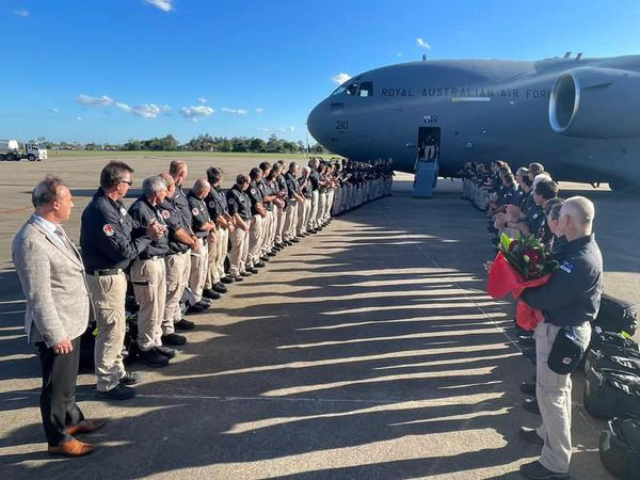This series of Living Legends is about Vida McLellan, a missionary nurse who served in Ethiopia from 1955 – 1974. Vida grew up on a farm in the out-back of New South Wales. In 1955, after nurses’ training and Bible College, she travelled to Ethiopia to serve in very remote and difficult areas in southern Ethiopia. Vida, married Dick McLellan, while at language school in 1955. For sixty years Vida has served alongside Dick both in Ethiopia and after their return to Australia.
In 1960 after 5 years in Ethiopia Vida and Dick and their children John and Jane sailed home to Australia by ship for a break and to tell their supporters of the work and raise more funds for their work in Ethiopia. Whilst in Australia Vida gave birth to their second daughter, Mimi. This was a totally different environment compared to giving birth in Ethiopia, for a start it was clean. Through generous supporters the family were able to raise enough funds to purchase a Land Rover 4X4 along with food, clothing, medical and building equipment.
After arriving back in Addis Ababa we were busy for the next few weeks getting our goods through customs and hiring a truck to take them back to Bulki. Dick bought the new Land Rover and went through all the usual bureaucratic nightmare needed to get his Ethiopian licence. When all this was finished, we packed up our new vehicle and started on our way back to Bulki over a very rough road. It was good to be in our own home again.
This next five year term at Bulki would turn out to be a real challenge. There were so many problems, discouragements, disappointments, sadness, hurt and as always, so very much to do. It was a time of terrible persecution. Evangelists and believers were arrested and ordered to deny their faith in Jesus. If they didn’t, they were severely beaten and put in prison under shocking conditions. Many were put in chains and that caused terrible sores. Some died. They had to rely on family and friends to bring food for them. Churches and houses were burned down and their families treated badly. You would think things couldn’t get any worse, but they did. Despite these things the churches were increasing and many more people believed in Jesus.
It was about this time that Baloti and her son Desta moved on to the compound to help me with the women’s work. I had first met Baloti in 1956 on our way to Bako. She and I became lifelong partners in crime. Baloti was a woman of great faith. She knew the Gofa language so well that she could translate for me. We had a group of young women who came for scripture classes and we taught them sewing. They made skirts and tops by hand stitching with a back stitch. They loved what they made and got all dressed to have a photo taken. It was clear that there was a great need for a women’s ministry in Gofa. Then l had an idea. Back in Australia I had been asked to speak at two Women’s Conventions and this set me to thinking: ‘Why not have a Women’s convention here on the mountains of Bulki?’ This would be a first in Ethiopia. There were many conferences for men, but nothing for women. A lot could go wrong. What if they didn’t come? What if it all fell through? So many problems. The fathers would have to stay at home and care for older children and the mother bring their babies with them for two or three days. Would they accept that? Dick talked to the elders and evangelists. They were happy with the idea. So we invited an American missionary colleague from Soddo, Selma Bergsten, who knew the language well and did women’s work in Woliatta to come as the main speaker along with Baloti.
Baloti had been born a slave. The chief, Dana Meja, had many slaves, one of whom was Baloti. In fact she wasn’t very important at all. Hardly even a person. She had less value than some of the cows that her master owned.
Dana Meja heard the good news from a very ordinary man called Wandaro. Wandaro was different. He was naïve, unassuming and totally guileless, but he was also bold and uninhibited. Dana Meja was used to people approaching him in timidity and fear for he was a great man, a powerful chief who owned a wide tract of land, the owner of many slaves, wives and herds of cattle and sheep. Wandaro was just a poorly clad stranger, but he said to the chief, “Someday you will die. If you do not repent and believe in Jesus Christ before you die, you will go to Hell. You will burn in the Lake of Fire that never goes out.” Nobody, but nobody, had ever spoken to the great chief, Dana Meja, in this way. ‘These words and Wandaro’s boldness made such an impression on the chief that he could not get Wandaro’s words out of his head. Eventually he believed. Then he went home and witnessed to his family. And, he witnessed to all his slaves. Then he made provisions for all his wives — I don’t know how many wives he had — and kept only his first wife. He also freed all his slaves. When Baloti turned sixteen years of age she was married to another slave, Omocho, who had also belonged to Dana Meja. Baloti and Omocho believed in the Lord Jesus. They made a vow that they would serve the Lord far better than they ever served Dana Meja. They learned to read and study the Bible.
God gave them a little daughter whom they named Persis. Persis grew to be a beautiful little girl who was inseparable from her mother. She was a joy. One day, however, Persis became very sick. She was taken to the SIM Hospital at Soddo, but no medicine could save her. She became worse and died. Baloti was expecting her second child at this time and the loss of Persis was very hard on her.
Continue on next issue










